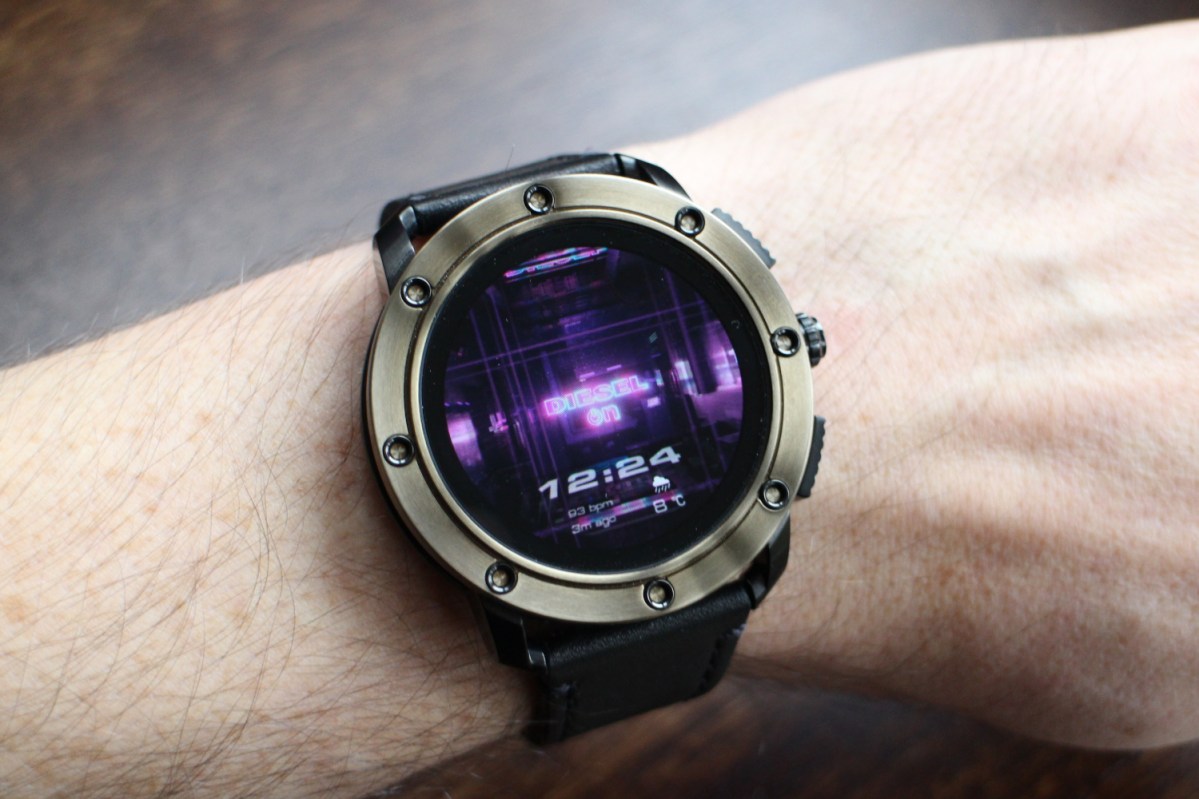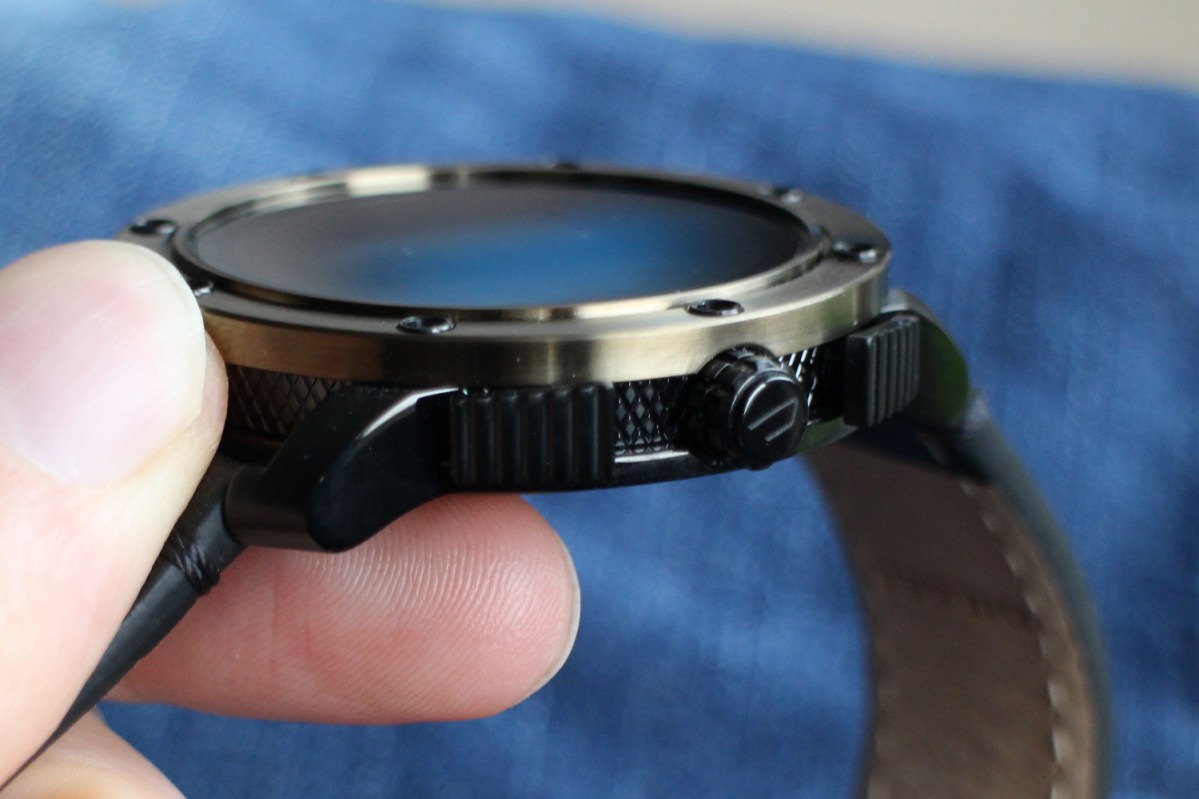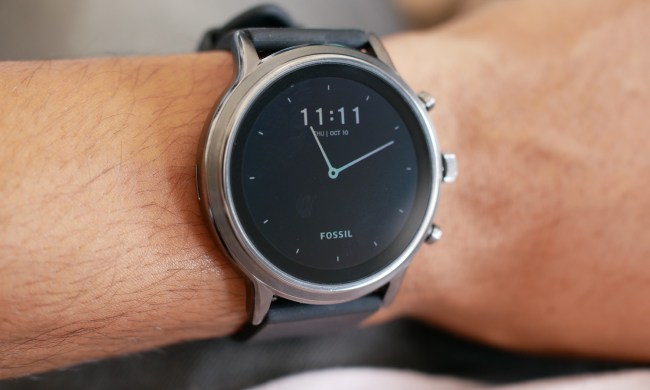“The Diesel On Axial is designed to make an impression, and succeeds.”
- Eye-catching design
- Heart rate monitor
- Google Pay support
- Built-in GPS
- Wear OS isn't always responsive
- Battery life is poor
Cast an eye over the line-up of fifth-generation Wear OS smartwatches made by The Fossil Group and the Diesel On Axial immediately jumps out at you. While most smartwatches are content to emulate classic, traditional designs, this big, brash statement of a watch is liable to provoke a reaction — both positive and negative.
Beyond the chunky exterior, you’ll find all the hardware you’re looking for, but you’re also going to have to put up with Wear OS’s lackluster experience. At $350, the Diesel On Axial is no impulse purchase, so if you’re buying it, you’ll have to be a big fan of the look and let software take a bit of a backseat.
Daring Diesel design
Fans of the brand will see Diesel’s design language coming across loud and clear in the On Axial. This is an unashamedly masculine watch with an enormous riveted porthole face that feels very steampunk, especially in the bronze color of my unit. Chiseled, textured buttons protrude to flank the crown while the crosshatched body is sandwiched by chunky concentric circles for bezels.
The bronze model comes with a black leather strap and a dark stainless steel case. You can also get it in silver with a black leather strap, gunmetal with a steel bracelet, or even silver with a blue denim strap for the truly brave.

When I say the Diesel On Axial is big, I mean it’s a 48mm watch. It’s going to look comically huge on small wrists, but if you love the oversized look then it will delight.
Switching to the Diesel On Axial from the Michael Kors Access Lexington 2, the contrast is stark, even though the internal components are the same. While the Michael Kors barely raised an eyebrow, the Diesel On Axial is impossible to ignore, but seems to provoke love and hate in equal measures. I love it, my wife does not, and polling friends and family has garnered a distinctly mixed reaction.
It’s refreshing to find a smartwatch that doesn’t try to pass itself off as a traditional watch. The standout design extends to the main watch face that Diesel offers; you can go with traditional hands if you want, but the animated tunnel is my favorite.

I find the 24mm leather strap comfortable, but you can always switch it. The Diesel On Axial fits best with a casual outfit; it’s too chunky for tighter shirt cuffs and may stand out more than you’d like in an office setting.
The Diesel On Axial has the same 1.28-inch AMOLED touchscreen as Fossil’s other smartwatches. It’s sharp enough to be easy to read, but it can be a little tricky to make out in direct sunlight.
Wear OS is a weakness
Just like the Fossil Gen 5 and the Lexington 2, the Diesel On Axial is packing a Snapdragon Wear 3100 processor and 1 GB of RAM. While that combination offers much-improved performance compared to older Fossil watches with lesser hardware, it’s still running Wear OS, which often feels unresponsive.
Sometimes I have to tap multiple times to get where I want, and everything takes a beat longer than it should. Thankfully, I didn’t have the same setup issues with the On Axial that I encountered with the Michael Kors watch, though.

You can swipe left to right for your day at a glance and Google Assistant, swipe the other way to run through your tiles, which can be set for items like Google Fit stats, your calendar, or a weather report. Swipe down from the top of the screen for settings and swipe up from the bottom for notifications.
You can also turn the crown to scroll up or down which works a lot better than the touchscreen, giving you more precise control. Pressing the crown gives you access to all your apps; the two buttons above and below it are configurable shortcuts for whatever you like.
A complete smartwatch
Heart rate sensor? Check. GPS? Check. Google Pay? Another tick in the box. What about 3 ATM waterproofing? 5 ATM would be nice, but a checkmark goes in the box nonetheless. And, of course, you have a microphone and speaker for phone calls.
The Diesel On Axial has pretty much all the hardware you can ask for, lacking only an ECG Monitor compared to the Apple Watch or Samsung Galaxy Watch Active 2, although it’s not yet enabled on the latter device. Of course, you can always get a separate device for ECG monitoring if it’s important to you.
Google Fit is perfect for casual fitness tracking; it keeps things relatively simple and helps you meet basic fitness goals. The heart rate sensor works well, and I also found that GPS tracked my cycling sessions pretty accurately.
It’s also handy to have Google Pay on your wrist when you’re trying to negotiate crowds and jump on a bus or get through the checkout in a hurry.

You can take and make phone calls from the Diesel On Axial, too — as long as it’s tethered to a phone. It requires a dive into the settings to enable it, though. It works well enough to be useful in an emergency when your phone is out of reach or your hands are full, but it’s not the first way I’d make my phone calls.
Google Assistant feels slow compared to my phone, but it works. The Diesel On Axial is also very handy as a remote control for music or podcasts that you’re playing from your phone.
There are a few preinstalled apps, mostly from Diesel, but also Spotify and Nike Run Club. You can get rid of them all if you like. Naturally, there are basics like a stopwatch and alarm clock, as well.
You have 8GB of storage to play with here, so you can install your own picks from the Play Store. It’s not the most inspiring selection, but shopping lists, messaging apps, fitness apps galore, and controls for music or smart home devices from the wrist can all prove useful.
Day-long battery life
You can reasonably expect to get a day from the Diesel On Axial, provided you don’t use it too much; tracking exercise, for instance, can really take a chunk out of usage time. There are unique battery modes designed to squeeze out more stamina, but they inevitably involve turning features off. What’s the point in having a smartwatch if you don’t use the smartwatch features? It may be useful to have these options in a pinch, though, and battery life is a weak point for smartwatches in general. But if you’d like to use your Axial to its full extent, you’d be wise to get into the routine of sticking it on the charger at bedtime.
Price, availability, and warranty
You can buy the Diesel On Axial from Amazon for $350. It comes with a two-year warranty that covers you for any manufacturing defects and states that a covered component will be repaired, or the watch will be replaced, free of repair charges if it proves to be defective in material or workmanship under normal use. If you are shopping on a budget, check out the best Black Friday smartwatch deals we found.
Our take
In a crowded market of forgettable smartwatch designs that are trying to blend in, the Diesel On Axial is a shining beacon of provocative fashion. Wear OS and battery life (not unrelated) let the experience down a little, but it ticks all the boxes for smartwatch hardware.
Are there any alternatives?
If you have an iPhone, you should buy the latest Apple Watch. It’s the best smartwatch by far, but pricing starts at $50 more — $400 — for the least expensive option.
Android users would be better served by the Samsung Galaxy Watch Active 2, especially if fitness tracking is important. It’s less expensive too, starting from $280, but lacks the bold styling of the Diesel watch.
You have a lot of options around this price point, so a gander at our best smartwatches list could be worth your time.
How long will it last?
Carved from tough stainless steel with water resistance up to 30 meters, the Diesel On Axial should last you for a few years. Battery degradation and sparse software support are more likely to prompt you to change by then.
Should you buy one?
Yes. If you love the look, it has all the top hardware you can expect from a Google Wear OS device.

